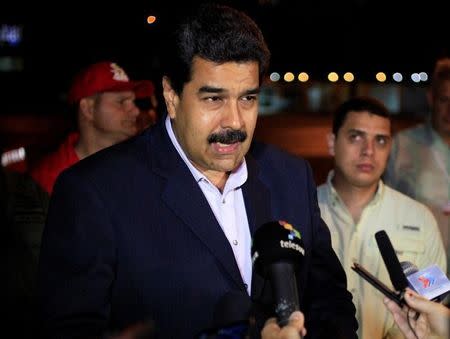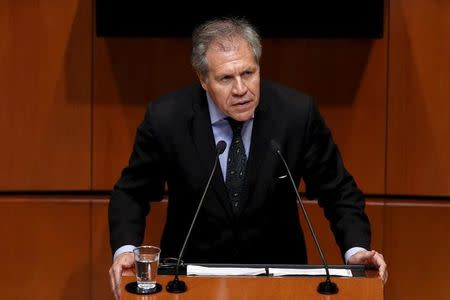OAS chief blames Maduro government for Venezuela crisis
By Lesley Wroughton WASHINGTON (Reuters) - The head of the OAS regional bloc, Luis Almagro, on Thursday blamed President Nicolas Maduro's government for Venezuela's crisis, saying the South American oil-rich nation was now mired in poverty, corruption and violence. Addressing the permanent council of the 34-nation Organization of American States (OAS), Almagro said Maduro's government had violated basic democratic principles, which had altered the constitutional order of the country. Despite opposition by Venezuela and allies like Ecuador and Bolivia to Thursday's proceedings, Almagro won the backing of a majority of member states to invoke the organization's democratic charter on Venezuela, which could eventually lead to the country's suspension. The meeting came as Washington opened new talks with Maduro's government this week to ease tensions between the ideological foes. The State Department described talks between veteran U.S. diplomat Tom Shannon and Venezuelan officials in Caracas as positive. Almagro said Venezuela's crisis had reached breaking point. "These challenges cannot be blamed on external forces," he told the council, "The situation facing Venezuela today is the direct result of the actions of those currently in power. "Venezuela should be one of the most prosperous and influential countries in the region. Instead, it is a state mired in corruption, poverty and violence. It is the population who suffers the consequences," he added. Almagro cited Venezuela's "unprecedented and unnecessary" humanitarian crisis, the jailing of opposition members and reports of torture as examples of abuses by the government against its people. The country's economic crisis has deepened in the wake of weaker global oil prices, while soaring inflation and food shortages have caused unrest. Almagro called on member states to support calls by Venezuelans for a referendum to recall Maduro. "Fundamental freedoms, human rights and democracy don't exist just when it's convenient. We are compelled to indicate problems wherever they may exist, especially so in a difficult context," Almagro said. "It is in keeping with these standards that we believe the constitutional order in Venezuela has been altered," he added. In a blistering attack on Almagro, which at times got personal, Venezuela's Foreign Minister Delcy Rodriguez accused him of orchestrating a coup to overthrow Maduro through the OAS actions. Accusing Almagro of an agenda against Venezuela, Rodriguez said: "If you were a McDonald's employee, listen to me, never would you be voted employee of the month." "This is a coup that is being carried out in this organization to over(throw) the legitimate government of President Nicolas Maduro," Rodriguez said in opening remarks. "How far will we go? What precedent will this set?" She said Almagro had demonstrated impartiality by meeting with leaders of Venezuela's opposition before the council meeting convened on Thursday. "This organization is being used to attack Venezuela," Rodriguez said, "It is a clear infringement of the rules of this organization. Is this how far we've gone?" she said, accusing Washington of influencing member states. "You are using this organization to twist the arms of the countries that are not subjective, but Venezuela will not subject itself to the instructions of any foreign government nor ...to the interference of coups that the secretary general is trying to support," she said. U.S. representative to the OAS, Mike Fitzpatrick, welcomed Almagro's report on Venezuela, saying it "complements and does not compete" with efforts underway to promote dialogue between Venezuela and the opposition. Separate from U.S. dialogue with Venezuela, former Spanish Prime Minister Jose Luis Rodriguez Zapatero is also trying to mediate between the government and opposition-led National Assembly. "All these processes can and should be proceeding simultaneously," said Fitzpatrick. "Venezuela's situation is complex and it would benefit from multiple, complementary diplomatic initiatives." (Editing by Bernadette Baum and Bernard Orr)



